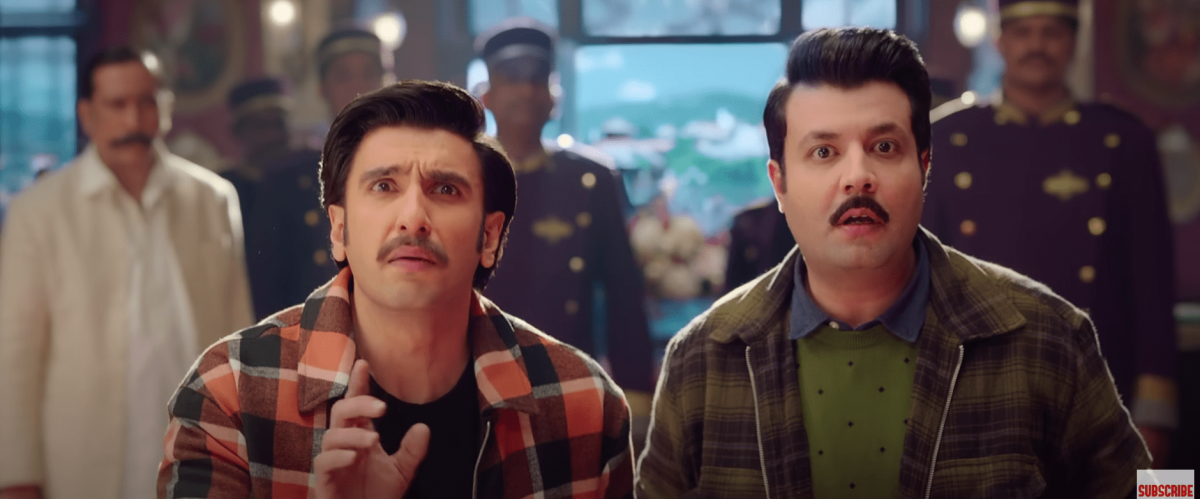Some questions surprise us by their mere existence.
Take this: What’s common to William Shakespeare, Gulzar, and…Rohit Shetty? The Comedy of Errors.
Shakespeare wrote it; Gulzar made a film on it (Angoor), and now Shetty, adapting the same story, has directed Cirkus. What a range – if Shakespeare and Gulzar were Bards, then Shetty is, well, bad. Among many flaws in his decades-old filmography, an incoherent screenplay ranks at the top. The Comedy of Errors, however, gives him a potent weapon: an excellent time-tested story that revels in incoherency.
Cirkus opens to a circus performer, Roy (Ranveer Singh), in Ooty, who is renowned for (literal) high-voltage stunts. Whenever he performs, his twin brother in Bangalore, Roy (Singh) – following the tradition of many Hindi potboilers – gets a rude electric jolt. They have a brother each, who are also twins, called Joy (Varun Sharma). When Roy_2 and Joy_2 travel from Bangalore to Ooty for a business deal, people start to recognise them – and, the chances are high, you know what follows.
Set in the early ’70s, Cirkus adopts a strange visual language: Almost the entire film seems to be shot on a set. It produces a foreign fairy-tale-like feel (which, unlike Gangubai Kathiawadi, doesn’t have a deep thematic reason). But this is a Shetty directorial where every ‘reason’ anagrams to arson, so let’s move on.

A still from Rohit Shetty’s ‘Cirkus’.
The second striking (and a potentially pleasant) facet is the director’s love for silly humour and Bollywood. Close to half-a-dozen old Hindi songs feature as comedic snippets; Sanjay Mishra’s character talks like the actor Jeevan; and many references – from Ittefaq to Andaz Apna Apna to China Gate to Shetty’s own films – keep popping up in the form of dialogues, characters, and mannerisms.
In most Shetty’s films, intentions and executions are worlds apart. In Cirkus, there’s an inter-planetary distance between the two (where the planet of execution is yet to be found). Here’s how this movie defines comedy: clumsy physical actions, exaggerated background score, contrived facial expressions. This goes on and on – and on and on – for over two unending hours.
Making a bad film is one thing; making one with such evident disinterest and laziness – that too, when you’ve the support of a celebrated text – is just Shetty filmmaking.
The screenwriters (there are three of them! – who would have thought) had to do one thing to make the movie borderline tolerable: Come up with more than a dozen jokes. Forget logic, character consistency, and all the highfalutin things that insufferable critics like to harp on: just give us good jokes.
But nothing – absolutely nothing. After a point, I became so desperate to make my time worthwhile that I began looking for jokes – if a character, for example, said a remotely kooky dialogue, I was prepared to laugh; if a character made an eccentric observation, I was prepared to laugh; if a character slipped on a banana, I was, my brothers, yes, prepared to laugh.
Think of a film critic going nuts in a theatre, internally screaming, “Mujhe jokes do! Mujhe jokes do! Mujhe jokes do!”
‘Give me jokes.’
But – yeah, you got it – nothing; just nothing. It’s not even a small film – the thing bleats and bores and lumbers for 140 minutes. (Note to myself: Should have just stayed home and cooked 70 packets of Maggi instead.)
Cirkus doesn’t just feel like shoddy filmmaking; it feels like a scam. An elaborate and effortless con game (as the writers didn’t even have to try writing a story – and whatever else they wrote, to quote Truman Capote commenting on Jack Kerouac, was “not writing [but] typing”).
I’m sure Shetty does have a genuine fondness for old Bollywood and silly humour (I’m myself a huge fan), but this isn’t tribute; it’s an insult. An insult to delightful Hindi cinema, an insult to innocent humour, an insult to the audiences who have made sure that after most Shetty comedies, the only person laughing (that too in a bank) is the director himself. Spare a thought for a grave in the Holy Trinity Church in Stratford-upon-Avon, where a 406-year-old hand must be itching to write this film’s shortest review: only errors, no comedy.
This article was first published on The Wire.

